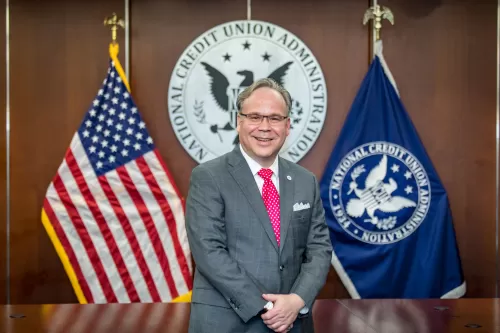NCUA Chairman Todd M. Harper at the NCUA's headquarters in Alexandria, Virginia.
As Prepared for Delivery on December 16, 2021
Thank you, Justin and Tom, for your presentation on the Subordinated Debt Emergency Capital Investment Program final rule. As noted in your presentation, this final rule is substantially similar to the proposed rule, and this rule received support from all of the stakeholders who weighed in during the comment period. Justin and Tom, this wide-spread support resulted from your excellent work in putting together this targeted and much-needed rule in a very short timeframe. Thank you both for a job well done.
This final rule will benefit eligible low-income credit unions that are participating in the U.S. Department of the Treasury’s Emergency Capital Investment Program, known as ECIP for short, as well as other programs administered by the U.S. government, that can be used to fund secondary capital. Specifically, this rule provides that the expiration of regulatory capital treatment for these issuances is the latter of 20 years from the date of issuance or January 1, 2042, so long as the agency approves those secondary capital plans by December 31.
The pandemic-induced recession hit communities of color and the poorest households the hardest. And, with the expiration of several pandemic-relief measures and rising prices for essentials like food, energy, transportation, and housing, many of these households will soon experience financial stress. In fact, last week, the New York Times featured an analysis about how the excess savings rate for the lowest quartile of households is quickly dwindling. The decline in cash reserves for these households “has vast implications for the working class and could dampen consumer spending, a large share of economic activity.”
In creating ECIP, Congress created a lifeline to support these underserved communities and help them recover from the pandemic. And, on Tuesday, the Treasury Department announced that 85 credit unions will receive billions of dollars in ECIP funding. The amount of these allocations ranged from less than $1 million to more than $200 million.
The funding provided by ECIP will be a game changer for participating MDI and CDFI credit unions and their communities. These institutions are often the only federally insured financial institutions in underserved areas, rural districts, and communities of color. Participating credit unions will leverage ECIP funds to lend to start-up small businesses, back eligible community development projects, and offer car and home loans. And, over time, the impact of these funds will grow exponentially as members pay back those initial loans and the participating credit unions make new ones.
However, CDFIs and MDIs cannot — and should not — bear this burden alone. In the months ahead, I encourage all credit unions to support safe, fair, and affordable lending to their members. With a cooperative structure and statutory mission of meeting the credit and savings needs of members, especially those of modest means, all credit unions have a moral obligation to step in and step up to support the needs of their members, local businesses, and communities. These actions will ensure a more stable economic recovery and foster greater economic opportunity. That is good for all Americans and good for our democracy.
Finally, after today’s vote, we still have one more step to complete to allow participating credit unions to maximize the use of ECIP funding. In a rulemaking next year, the NCUA Board will act to permit ECIP funding to count as regulatory capital for the entire time it is held — a total of 30 years — instead of the current regulatory cap of 20 years on secondary capital. I look forward to working with my fellow Board Members on this important work.
That concludes my remarks. I now recognize Vice Chairman Hauptman for any comments or questions that he may have.




